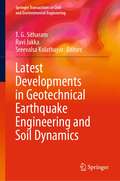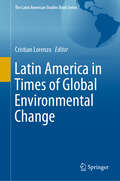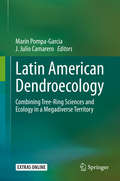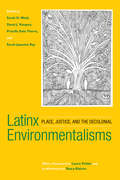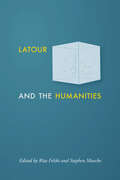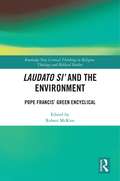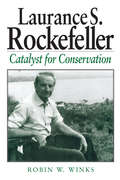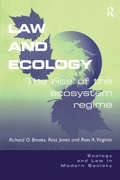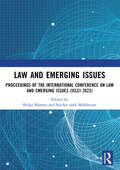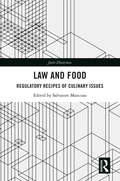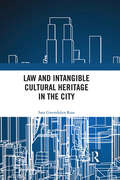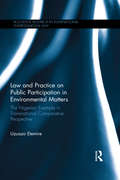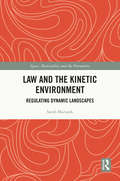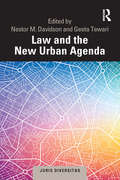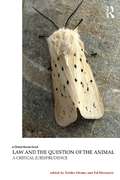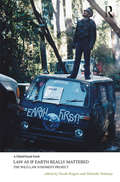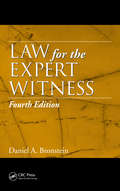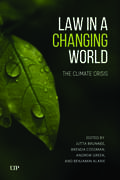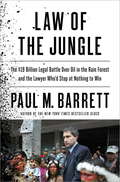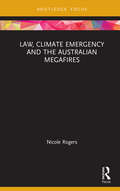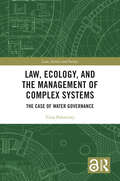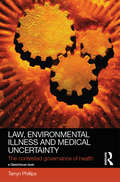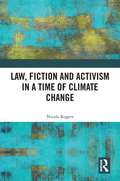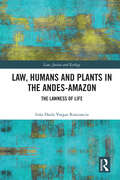- Table View
- List View
Latest Developments in Geotechnical Earthquake Engineering and Soil Dynamics (Springer Transactions in Civil and Environmental Engineering)
by T. G. Sitharam Sreevalsa Kolathayar Ravi JakkaThis volume brings together contributions from world renowned researchers and practitioners in the field of geotechnical engineering. The chapters of this book are based on the keynote and invited lectures delivered at the 7th International Conference on Recent Advances in Geotechnical Earthquake Engineering and Soil Dynamics. The book presents advances in the field of soil dynamics and geotechnical earthquake engineering. A strong emphasis is placed on proving connections between academic research and field practice, with many examples, case studies, best practices, and discussions on performance-based design. This volume will be of interest to research scholars, academicians and industry professionals alike.
Latin America in Times of Global Environmental Change (The Latin American Studies Book Series)
by Cristian LorenzoThis volume discusses the challenges of Latin America in global environmental geopolitics. Written by leading experts, this book brings together Latin American research on global environmental change. They cover a range of topics such as climate change, water, forest and biodiversity conservation connected with science policies, public opinion, priorities of international funds, and international politics of Latin American countries. The book describes the discrepancy between the international priorities and the regional needs or country interests. It includes several case studies and analyses the cooperation in multilateral negotiations on climate change. It also offers a synthesis of debates around global environmental changes and Latin American politics, which the authors have previously promoted in different academic events in South America, including in Santiago de Chile in Chile, and Buenos Aires and Ushuaia in Argentina.This book assesses the environmental problems from different perspectives, highlights the scientific development in the environmental changes affecting Latin America and offers a new view on geopolitics to help face those issues. Specialist readers in international relations, political sciences, environmental sciences, geography and geopolitics will appreciate this up-to-date examination of Latin America and the global environmental change.
Latin American Dendroecology: Combining Tree-Ring Sciences and Ecology in a Megadiverse Territory
by J. Julio Camarero Marín Pompa-GarcíaLatin America is a megadiverse territory hosting several hotspots of plant diversity and many types of forest biomes, ecosystems and climate types, from tropical rainforest to semi-arid woodlands. This combination of diverse forests and climates generates multiple responses to ecological changes affecting the structure and functioning of forest ecosystems. Recently, there have been major efforts to improve our understanding of such impacts on ecosystems processes. However, there is a dearth of studies focused on Latin-American forest ecosystems that could provide novel insights into the patterns and mechanisms of ecological processes in response to environmental stress. The abundance of “New World” tree species with dendrochronological potential constitutes an ideal opportunity to improve the ecological state of knowledge regarding these diverse forest types, which are often threatened by several impacts such as logging or conversion to agricultural lands. Thus, detailed information on the dendroecology of these species will improve our understanding of forests in the face of global change. Accordingly, this book identifies numerous relevant ecological processes and scales, ranging from tree species to populations and communities, and from both dendrochronological and dendroecological perspectives. It offers a valuable reference guide for the exploration of long-term ecological interactions between trees and their environmental conditions, and will foster further research and international projects on the continent and elsewhere.
Latinx Environmentalisms: Place, Justice, and the Decolonial
by Stacy AlaimoThe whiteness of mainstream environmentalism often fails to account for the richness and variety of Latinx environmental thought. Building on insights of environmental justice scholarship as well as critical race and ethnic studies, the editors and contributors to Latinx Environmentalisms map the ways Latinx cultural texts integrate environmental concerns with questions of social and political justice. Original interviews with creative writers, including Cherríe Moraga, Helena María Viramontes, and Héctor Tobar, as well as new essays by noted scholars of Latinx literature and culture, show how Latinx authors and cultural producers express environmental concerns in their work. These chapters, which focus on film, visual art, and literature—and engage in fields such as disability studies, animal studies, and queer studies—emphasize the role of racial capitalism in shaping human relationships to the more-than-human world and reveal a vibrant tradition of Latinx decolonial environmentalism. Latinx Environmentalisms accounts for the ways Latinx cultures are environmental, but often do not assume the mantle of “environmentalism.”
Latour and the Humanities
by Rita Felski and Stephen MueckeHow does the work of influential theorist Bruno Latour offer a fresh angle on the practices and purposes of the humanities?In recent years, defenses of the humanities have tended to argue along predictable lines: the humanities foster empathy, the humanities encourage critical thinking, the humanities offer a counterweight to the cold calculations of the natural and social sciences. The essays in Latour and the Humanities take a different approach. Exploring the relevance of theorist Bruno Latour's work, they argue for attachments and entanglements between the humanities and the sciences while looking closely at the interests, institutions, and intellectual projects that shape the humanities within and beyond the university. The collection, which is written by a group of highly distinguished scholars from around the world, is divided into two sections. In the first part, authors engage in depth with Latour's work while also rethinking the ties between the humanities and the sciences. Essays argue for greater attention to the nonhuman world, the urgency of climate change, and more nuanced views of universities as institutions. The second half of the volume contains essays that reflect on Latour's influence on the practices of specific disciplines, including art, the digital humanities, film studies, and political theory.Inspiring conversation about the relevance of actor-network-theory for research and teaching in the humanities, Latour and the Humanities offers a substantial introduction to Latour's work while discussing the humanities without falling back on the genres of either the sermon or the jeremiad. This volume will be of interest to all those searching for fresh perspectives on the value and importance of humanistic disciplines and thought.Contributors: David J. Alworth, Anders Blok, Claudia Breger, Dipesh Chakrabarty, Yves Citton, Steven Connor, Gerard de Vries, Simon During, Rita Felski, Francis Halsall, Graham Harman, Antoine Hennion, Casper Bruun Jensen, Bruno Latour, Heather Love, Patrice Maniglier, Stephen Muecke, Barbara Herrnstein Smith, Nigel Thrift, Michael Witmore
Laudato Si’ and the Environment: Pope Francis’ Green Encyclical (Routledge New Critical Thinking in Religion, Theology and Biblical Studies)
by Robert McKimThis volume is a response to the Pope’s Laudato Si’, giving an interdisciplinary overview of its impact on the environmental concerns of Catholics as well as other religious groups. Published in 2015, it is often seen as an "environmental" encyclical and in it the Pope urges us to face up to the crisis of climate change. He argues that all of us should prioritise taking better care of the Earth, our common home, while also attending to the plight of the poor. Written by an international and multidisciplinary team of leading scholars, the Pope’s invitation to all people to begin a new dialog about these matters is considered from a variety of perspectives. There is discussion of the implications for immigration, population control, eating animals, and property ownership. Additionally, indigenous religious perspectives, development and environmental protection, and the implementation of the ideas of the encyclical in the Church are explored. Each chapter deals with the scriptural, theological, and philosophical underpinnings of the encyclical, as well as other central concepts such as interconnectedness, the role of practice, and what Pope Francis calls the "technocratic paradigm". This book expertly illuminates the relationship between Laudato Si’ and environmental concerns. It will, therefore, be vital reading for anyone studying religion and the environment, environmental ethics, Catholic theology, and environmental thought.
Laurance S. Rockefeller: Catalyst For Conservation
by Robin W. Winks Bruce BabbittDespite his status as a scion of one of the wealthiest and most famous families in the United States and an enormously successful businessman in his own right, Laurance S. Rockefeller is unknown to all but a few Americans. Yet while he has been neither Vice President nor Governor nor chairman of the world's largest bank, his contribution to society has been at least as great as that of his more famous brothers. In Laurance S. Rockefeller: Catalyst for Conservation, noted historian Robin W. Winks brings Laurance to the forefront, offering an intimate look at his life and accomplishments. While Rockefeller has played a vital role in the business world as one of the most astute venture capitalists of our time--providing seed money for, among other endeavors, Eastern Airlines, Intel Corporation, and Apple Computers--his driving passion throughout his life has been the environment In addition to donating millions of dollars and the helping to found numerous conservation organizations, he served under five consecutive presidents in environmental advisory capacities. As chairman of the Outdoor Recreation Resources Review Commission (ORRRC) under Presidents Eisenhower and Kennedy, Rockefeller orchestrated an assessment of the recreation and conservation needs of the American people and the policies and programs required to meet those needs. The reports issued by the Commission are a groundbreaking achievement that laid the framework for nearly all significant environmental legislation of the following three decades. Winks uses a combination of historical insight and extensive research to present the first in-depth examination of Laurance Rockefeller's life and work. His book explores Rockefeller's role in the transition from traditional land conservation to a more inclusive environmentalism. It compels broader interpretation of the history of environmental protection, and is essential reading for anyone concerned with the past or future of conservation in America.
Lavender: The Grower's Guide
by Virginia McnaughtonA book on different types of lavender and how to grow them
Law and Ecology: The Rise of the Ecosystem Regime (Ecology and Law in Modern Society)
by Ross Jones Richard O. BrooksIn 1970 Earth Day was first celebrated marking the dawn of worldwide environmental consciousness and the passing of many environmental laws. In part, these events were the result of the maturing of the science of ecology which recognized the interdependence of the web and cycles of nature. This volume explores the relationship between ecology and environmental law, beginning with a description of the two very different disciplines. This description is followed by a history of their episodic interactions: the early period of origin, the mid-century formative period from 1950 to 1970, the initial serious period of interaction after Earth Day in 1970 and the testing of the relationship during the next two decades. Utilizing a number of case studies, examinations of the key 'linkage persons', legal instruments and the migration of ecological concepts and frameworks, this book analyzes the final flowering of an ecosystem regime which embraces the connections between the two disciplines of ecology and environmental law. Concluding with an inventory of the problems posed by the relationship between the two disciplines and an agenda for future research, this clearly structured, comprehensive and stringent book is an essential resource for all serious scholars and students of ecology and environmental law.
Law and Emerging Issues: Proceedings of the International Conference on Law and Emerging Issues (ICLEI 2023)
In the ever-evolving landscape of law and governance, adaptation and innovation are key to addressing the challenges of our times. This edited volume is a testament to the ever-evolving nature of the legal field and the ongoing efforts of legal scholars and academicians to dissect, analyze, and grapple with the challenges and opportunities presented by these changes. The topics covered in this book span a wide spectrum of legal domains, reflecting the complex and rapidly changing nature of our contemporary world. From corporate governance structures to emerging challenges in the digital space, from analyzing the implications of the Social Security Code 2020 in India to understanding the legal developments surrounding unorganized migrant workers during the COVID-19 pandemic, the breadth of subjects addressed here is both impressive and vital.
Law and Food: Regulatory Recipes of Culinary Issues (Juris Diversitas)
by Salvatore MancusoThis book presents a range of insights on the relationship between food and law. Over time, religions have multiplied food prohibitions and prescriptions, customs have redistributed land, shared its occupancy in creative ways, or favoured communal property so that everyone could have access to food. In turn, laws have multiplied to facilitate food trade, security, safety, traceability, and also to promote and protect food and wine production, using trademarks and geographical denominations. This volume brings a comparative and interdisciplinary approach to examine some of the most heavily debated issues in the interaction between food, in all forms, and the law. Topics covered include food security, food safety, food quality, intellectual property, and consumer protection. As well as highlighting current issues, the work also points to new challenges in this field. The book will be a valuable resource for researchers and policy-makers working in the area of Food Law and Comparative Law.
Law and Intangible Cultural Heritage in the City
by Sara Gwendolyn RossWith disappearing music venues, and arts and culture communities at constant risk of displacement in our urban centers, the preservation of intangible cultural heritage is of growing concern to global cities. This book addresses the role and protection of intangible cultural heritage in the urban context. Using the methodology of Urban Legal Anthropology, the author provides an ethnographic account of the civic effort of Toronto to become a Music City from 2014-18 in the context of redevelopment and gentrification pressures. Through this, the book elucidates the problems cities like Toronto have in equitably protecting intangible cultural heritage and what can be done to address this. It also evaluates the engagement that Toronto and other cities have had with international legal frameworks intended to protect intangible cultural heritage, as well as potential counterhegemonic uses of hegemonic legal tools. Understanding urban intangible cultural heritage and the communities of people who produce it is of importance to a range of actors, from urban developers looking to formulate livable and sustainable neighbourhoods, to city leaders looking for ways in which their city can flourish, to scholars and individuals concerned with equitability and the right to the city. This book is the beginning of a conservation about what is important for us to protect in the city for future generations beyond built structures, and the role of intangible cultural heritage in the creation of full and happy lives. The book is of interest to legal and sociolegal readers, specifically those who study cities, cultural heritage law, and legal anthropology.
Law and Practice on Public Participation in Environmental Matters: The Nigerian Example in Transnational Comparative Perspective (Routledge Research in International Environmental Law)
by Uzuazo EtemirePublic participation has become a recurring theme and a topical issue in the field of international environmental law, with many multilateral environmental instruments calling on states to guarantee effectively the concept in their laws and practices. This book focuses on public participation in environmental governance, in terms of public access to environmental information and public participation in environmental decision-making processes. Drawing on the body of international best practice principles in environmental law and taking a comparative stance, Uzuazo Etemire takes Nigeria as a key case, evaluating its procedural laws and practices in relation to public access to information and participation in decision-making in environmental matters. In working to clarify and deepen understanding of the current status of environmental public participation rights in Nigeria, the book addresses key issues in environmental governance for developing and transitional countries and the potential for public participation to improve the state of the environment and public wellbeing. This book will be of great interest to undergraduate students (as further reading) and post-graduate students, academics, researchers, relevant government agencies and departments, policy-makers and NGOs in the fields of international environmental law, environmental justice, environmental/natural resource management, development studies and international finance.
Law and the Kinetic Environment: Regulating Dynamic Landscapes (Space, Materiality And The Normative Ser.)
by Sarah MarusekThis book addresses the legal-geographical implications of the fact that landscapes are not static, but dynamic. Within the field of legal geography, the spatial relationship of law to landscape is usually considered to be static. Environments are often considered fixed, and consequently inert, as places that literally don’t go anywhere. Typically, then, it is what happens in these places, rather than the place itself, that commands academic attention. In contrast to this static viewpoint, Law and the Kinetic Environment considers how many landscapes are in flux and, as a result, may be seen as dynamic. Natural phenomena, such as oozing lava, moving glaciers, or bubbling geothermal pools, challenge and test the normative conceptualizations of stability of place, property ownership, and legal regulation. Consequently, such dynamic landscapes enliven and transform law, offering new jurisprudential insights into what law is and how it operates in response to the kineticism that, this book argues is, to some degree, inherent in all landscapes. This original engagement with legal geography will appeal to those with general interests in this area, as well as specific concerns with questions of law and place, property and the environment.
Law and the New Urban Agenda: A Comparative Perspective (Juris Diversitas)
by Nestor M. Davidson Geeta TewariThe New Urban Agenda (NUA), adopted in 2016 at the United Nations Conference on Housing and Sustainable Urban Development (Habitat III) in Quito, Ecuador, represents a globally shared understanding of the vital link between urbanization and a sustainable future. At the heart of this new vision stand a myriad of legal challenges – and opportunities – that must be confronted for the world to make good on the NUA’s promise. In response, this book, which complements and expands on the editors’ previous volumes on urban law in this series, offers a constructive and critical evaluation of the legal dimensions of the NUA. As the volume’s authors make clear, from natural disasters and resulting urban migration in Honshu and Tacloban, to innovative collaborative governance in Barcelona and Turin, to accessibility of public space for informal workers in New Delhi and Accra, and power scales among Brazil’s metropolitan regions, there is a deep urgency for thoughtful research to understand how law can be harnessed to advance the NUA’s global mission of sustainable urbanism. It thus creates a provocative and academic dialogue about the legal effects of the NUA, which will be of interest to academics and researchers with an interest in urban studies.
Law and the Question of the Animal: A Critical Jurisprudence (Law, Justice and Ecology #1)
by Yoriko Otomo Ed MussawirThis book addresses the problem of ‘animal life’ in terms that go beyond the usual extension of liberal rights to animals. The discourse of animal rights is one that increasingly occupies the political, ethical and intellectual terrain of modern society. But, although the question of the status of animals holds an important place within a range of civil, political and technological disciplines, the issue of rights in relation to animals usually rehearses the familiar perspectives of legal, moral and humanist philosophy. ‘Animal law’ is fast becoming a topic of significant contemporary interest and discussion. This burgeoning interest has not, however, been matched by renewed inquiry into the jurisprudential frames and methods for the treatment of animals in law, nor the philosophical issue of the ‘human’ and the ‘animal’ that lies at law’s foundation. Responding to this interest, Law and the Question of the Animal: A Critical Jurisprudence brings together leading and emerging critical legal theorists to address the question of animality in relation to law’s foundations, practices and traditions of thought. In so doing, it engages a surprisingly underdeveloped aspect of the moral philosophies of animal rights, namely their juridical register and existence. How does ‘animal law’ alter our juridical image of personality or personhood? How do the technologies of law intersect with the technologies that invent, create and manage animal life? And how might the ethical, ontological and ceremonial relation between humans and animals be linked to a common source or experience of law?
Law as if Earth Really Mattered: The Wild Law Judgment Project (Law, Justice and Ecology)
by Nicole Rogers Michelle MaloneyThis book is a collection of judgments drawn from the innovative Wild Law Judgment Project. In participating in the Wild Law Judgment Project, which was inspired by various feminist judgment projects, contributors have creatively reinterpreted judicial decisions from an Earth-centred point of view by rewriting existing judgments, or creating fictional judgments, as wild law. Authors have confronted the specific challenges of aligning existing Western legal systems with Thomas Berry’s philosophy of Earth jurisprudence through judgment writing and rewriting. This book thus opens up judicial decision-making and the common law to critical scrutiny from a wild law or Earth-centred perspective. Based upon ecocentric rather than human-centred or anthropocentric principles, Earth jurisprudence poses a unique critical challenge to the dominant anthropocentric or human-centred focus and orientation of the common law. The authors interrogate the anthropocentric and property rights assumptions embedded in existing common law by placing Earth and the greater community of life at the centre of their rewritten and hypothetical judgments. Covering areas as diverse as tort law, intellectual property law, criminal law, environmental law, administrative law, international law, native title law and constitutional law, this unique collection provides a valuable tool for practitioners and students who are interested in learning more about the emerging ecological jurisprudence movement. It helps us to see more clearly what a new system of law might look like: one in which Earth really matters.
Law for the Expert Witness
by Daniel A. BronsteinExtensively updated and expanded to incorporate legislative and practical changes enacted since the publication of the previous edition, Law for the Expert Witness, Fourth Edition is designed for professionals and students requiring edification on the current processes and techniques of legal procedure.Drawn from revised versions of the readings as
Law in a Changing World: The Climate Crisis
by Andrew Green Brenda Cossman Benjamin Alarie Jutta BrunneeLaw in a Changing World explores how climate change is reshaping the law, drawing on contributions from legal scholars across diverse fields. The book examines how climate change impacts areas such as governance, justice, housing, and disability law. Rather than focusing on climate law alone, the chapters explore how climate change is challenging foundational legal concepts and demanding adaptations across various sectors.The authors consider the roles of international, Indigenous, and domestic legal systems in addressing climate-related issues. Topics include climate justice for vulnerable populations, the role of government in crisis management, and the intersection of law with emerging challenges like housing and disability rights. Law in a Changing World provides a comprehensive, cross-disciplinary examination of how legal frameworks can respond to climate-related emergencies and injustices, offering fresh perspectives on the role of law in a warming world. It is an essential read for those interested in the intersection of law, policy, and climate change.
Law of the Jungle
by Paul M. BarrettThe gripping story of one American lawyer's obsessive crusade--waged at any cost--against Big Oil on behalf of the poor farmers and indigenous tribes of the Amazon rainforest.Steven Donziger, a self-styled social activist and Harvard educated lawyer, signed on to a budding class action lawsuit against multinational Texaco (which later merged with Chevron to become the third-largest corporation in America). The suit sought reparations for the Ecuadorian peasants and tribes people whose lives were affected by decades of oil production near their villages and fields. During twenty years of legal hostilities in federal courts in Manhattan and remote provincial tribunals in the Ecuadorian jungle, Donziger and Chevron's lawyers followed fierce no-holds-barred rules. Donziger, a larger-than-life, loud-mouthed showman, proved himself a master orchestrator of the media, Hollywood, and public opinion. He cajoled and coerced Ecuadorian judges on the theory that his noble ends justified any means of persuasion. And in the end, he won an unlikely victory, a $19 billion judgment against Chevon--the biggest environmental damages award in history. But the company refused to surrender or compromise. Instead, Chevron targeted Donziger personally, and its counter-attack revealed damning evidence of his politicking and manipulation of evidence. Suddenly the verdict, and decades of Donziger's single-minded pursuit of the case, began to unravel. Written with the texture and flair of the best narrative nonfiction, Law of the Jungle is an unputdownable story in which there are countless victims, a vast region of ruined rivers and polluted rainforest, but very few heroes.
Law, Climate Emergency and the Australian Megafires
by Nicole RogersThis book addresses the ways in which the Black Summer megafires influenced the development of climate narratives throughout 2020. It analyses the global pandemic, and its ensuing restrictions, as a countervailing force in the production of such narratives. Lives and properties were lost in the spring and summer of 2019 and 2020, when catastrophic bushfires burnt through millions of hectares of mainland Australia. Nearly three billion native animals died. And for millions of Australians, and others worldwide, it was through the Australian megafires that the global climate emergency became tangible, concrete, no longer a comfortably deferred, albeit problematic abstraction which could be consigned to future generations to deal with. This book explores the legal and other implications of new understandings of climate emergency arising from the fires, and the emergence of a hierarchy of emergencies as the pandemic came to dominate global and domestic political discourses. It examines narratives of culpability, and legal avenues for seeking retribution from government and big fossil fuel emitters. It also considers the impact of the fires on the burgeoning phenomenon of climate activism, particularly in Australia, and the ways in which pandemic restrictions curtailed such activism. Finally, the book reflects on the fires through the lenses offered by climate fiction, and apocalyptic fiction more generally, in order to consider how these shape, and might shape, our responses to them. This important and timely book will appeal to environmental lawyers and socio-legal theorists; as well as other scholars and activists with interests in climate change and its impact. It is recommended for anyone concerned about current and future climate disasters, and the shortcomings in legal, political and popular responses to the climate crisis.
Law, Ecology, and the Management of Complex Systems: The Case of Water Governance (Law, Science and Society)
by Tiina PaloniittyThis book addresses the role of law in the adaptive management of socioecological systems. Recent years have witnessed a rise in discussion over the relation between adaptivity and law; as if after decades of insouciance, legal scholars have finally started to understand the impacts of the scientific paradigm called adaptive management to the legal sphere. Even though the complicated relations between law and the adaptive management of socioecological systems have become more debated, a thorough examination of the scientific and theoretical fundamentals of such endeavours has yet to be presented. Using the illustrative example of European Union water governance and its path towards embracing adaptive management, this book emphasises the legal significance of properly understanding the manner in which scientific knowledge of the environment is produced. Though always pivotal, rigorously apprehending science is especially crucial when dealing with the management of complex ecosystems as the ‘normative’ is created gradually before law begins to examine the ‘facts’ of the matter. After examining the roots of adaptive management, this book argues that the legal needs to understand itself as an integral part of the process of the socioecological management of complex systems, and not merely an external umpire resolving disputes. As whole the book offers new insights into the Union regulator’s approaches to scientific realities, making it an interesting read not only to academics and legal scholars but also to regulators striving to deepen their understanding or pondering which approach to adopt in the face of new regulatory challenges, and to scientists interested in the science and law aspects of their work.
Law, Environmental Illness and Medical Uncertainty: The Contested Governance of Health (Social Justice)
by Tarryn PhillipsWe’ve seen it before, with asbestos-related disease, leukaemia clusters and lung cancer caused by cigarettes. There tends to be a lag between the emergence of environmental risks and chemical injuries, and their recognition and therapeutic treatment by medicine and the law. Law, Environmental Illness and Medical Uncertainty examines how our society governs new health concerns as they emerge, and the barriers that face new and uncertain theories seeking recognition in the law. In this book, Tarryn Phillips focuses her investigation on the struggle over the controversial condition multiple chemical sensitivities, or MCS (also known as environmental illness). Presenting nine case studies where workers sought compensation for MCS from their multinational employers, she captures a nuanced portrait of their embittered, unequal battles over the scientific, legal and insurance paradigms for understanding toxic risk, environmental illness and the regulation of industry. It draws on three years of fieldwork in Australia, including interview data with lay people and sympathetic and sceptical experts, participant observation in the courtroom and textual analysis of official reports. The book gives a unique, ethnographic insight into the governance of risk and uncertainty within a neoliberal economy, medico-scientific controversies and courtroom dramas. It highlights how a skeptical approach towards emergent environmental concerns is encouraged within the current regime, and decision-makers face disincentives for taking a sympathetic approach. Compellingly written and easy to read, it should appeal widely to interested lay people, and students and scholars of science and technology studies, medical anthropology, sociology of health and illness, and critical legal studies.
Law, Fiction and Activism in a Time of Climate Change
by Nicole RogersThe book examines the narratives of climate change which have developed and which are currently evolving in three areas: law, fiction and activism. Narratives of climate change generated by litigants, judges, writers of fiction and activists are having, and will have, a profound effect on the way we respond to the climate change crisis. Acknowledging the prevalence of unreliable narrators, this book explores the reliability and significance of different forms of climate narrative. The author analyses overlapping themes and points of intersection, considering the recurrent motif of the trickster, the prominence of the child, the significance and ongoing viability of the rights discourse, and the increasingly prevalent emergency framing with its multiple implications for law’s empire. She asks how law, fiction and activism measure up as textual and performative fora for telling the story of climate change and anticipating a climate-changed future. And, in addition, how can they help foster transformative narratives which empower us to confront the climate change crisis? This highly topical, cross-disciplinary work will be of interest to anyone concerned about the growing climate emergency and makes a valuable contribution to climate law, environmental law, the environmental humanities and ecocriticism.
Law, Humans and Plants in the Andes-Amazon: The Lawness of Life (Law, Justice and Ecology)
by Iván Darío Vargas RoncancioExtending law beyond the human, the book examines the conceptual openings, methodological challenges, and ethical conundrums of law in a time of socio-ecological transition. How do we learn and practice law across epistemic and ontological difference? What sort of methodologies do we need? In what sense does conjuring other-than-human beings as sentient, cognitive and social agents—rather than mere recipients of state-sanctioned rights—transform what we mean by law and rights of nature in Latin America and beyond? Legal institutions exclusively focused on human perspectives seem insufficiently capable of addressing current socio-ecological challenges in Latin America and beyond. In response, this book strives to integrate other-than-human beings within legal thinking, institutions, and decision-making protocols. Weaving together various fields of knowledge and worldmaking practices that include – but are not limited to – Indigenous legal traditions, ecological law, multispecies ethnography, and ecological economics, the book pursues a multi-sited ethnography that focuses on the entanglement of law, ecology, and Indigenous cosmologies in Southern Colombia. In so doing, it articulates a general post-anthropocentric legal theory which is proposed, a tool to address socio-ecological challenges such as climate change and bio-cultural loss. This book will be of interest to scholars and students in the disciplines of environmental law, Earth law and ecological law, legal theory and critical legal studies; as well as others working in the in the fields of Indigenous studies, environmental humanities, legal anthropology, and sustainability and climate change justice.
